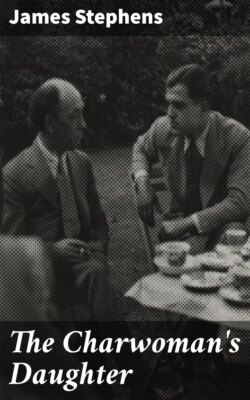Читать книгу The Charwoman's Daughter - James Stephens - Страница 7
На сайте Литреса книга снята с продажи.
IV
ОглавлениеTable of Contents
Every afternoon a troop of policemen marched in solemn and majestic single file from the College Green Police Station. At regular intervals, one by one, a policeman stepped sideways from the file, adjusted his belt, touched his moustache, looked up the street and down the street for stray criminals, and condescended to the duties of his beat.
At the crossing where Nassau and Suffolk Streets intersect Grafton Street one of these superb creatures was wont to relinquish his companions, and there in the centre of the road, a monument of solidity and law, he remained until the evening hour which released him again to the companionship of his peers.
Perhaps this point is the most interesting place in Dublin. Upon one vista Grafton Street with its glittering shops stretches, or rather winds, to the St. Stephen's Green Park, terminating at the gate known as the Fusiliers' Arch, but which local patriotism has rechristened the Traitors' Gate. On the left Nassau Street, broad and clean, and a trifle vulgar and bourgeois in its openness, runs away to Merrion Square, and on with a broad ease to Blackrock and Kingstown and the sea. On the right hand Suffolk Street, reserved and shy, twists up to St. Andrew's Church, touches gingerly the South City Markets, droops to George's Street, and is lost in mean and dingy intersections. At the back of the crossing Grafton Street continues again for a little distance down to Trinity College (at the gates whereof very intelligent young men flaunt very tattered gowns and smoke massive pipes with great skill for their years), skirting the Bank of Ireland, and on to the river Liffey and the street which local patriotism defiantly speaks of as O'Connell Street, and alien patriotism, with equal defiance and pertinacity, knows as Sackville Street.
To the point where these places meet, and where the policeman stands, all the traffic of Dublin converges in a constant stream. The trams hurrying to Terenure, or Donnybrook, or Dalkey flash around this corner; the doctors, who, in these degenerate days, concentrate in Merrion Square, fly up here in carriages and motor-cars; the vans of the great firms in Grafton and O'Connell Streets, or those outlying, never cease their exuberant progress. The ladies and gentlemen of leisure stroll here daily at four o'clock, and from all sides the vehicles and pedestrians, the bicycles and motor bicycles, the trams and the outside cars rush to the solitary policeman, who directs them all with his severe but tolerant eye. He knows all the tram-drivers who go by, and his nicely graduated wink rewards the glances of the rubicund, jolly drivers of the hackneys and the decayed jehus with purple faces and dismal hopefulness who drive sepulchral cabs for some reason which has no acquaintance with profit; nor are the ladies and gentlemen who saunter past foreign to his encyclopedic eye. Constantly his great head swings a slow recognition, constantly his serene finger motions onwards a well-known undesirable, and his big white teeth flash for an instant at young, laughing girls and the more matronly acquaintances who solicit the distinction of his glance.
To this place, and about this hour, Mary Makebelieve, returning from her solitary lunch, was wont to come. The figure of the massive policeman fascinated her. Surely everything desirable in manhood was concentrated in his tremendous body. What an immense, shattering blow that mighty fist could give! She could imagine it swinging vast as the buffet of an hero, high-thrown and then down irresistibly--a crashing, monumental hand. She delighted in his great, solid head as it swung slowly from side to side, and his calm, proud eye--a governing, compelling, and determined eye. She had never met his glance yet: she withered away before it as a mouse withers and shrinks and falls to its den before a cat's huge glare. She used to look at him from the kerbstone in front of the chemist's shop, or on the opposite side of the road, while pretending to wait for a tram; and at the pillar-box beside the optician's she found time for one furtive twinkle of a glance that shivered to his face and trembled away into the traffic. She did not think he noticed her; but there was nothing he did not notice. His business was noticing: he caught her in his mental policeman's notebook the very first day she came; he saw her each day beside, and at last looked for her coming and enjoyed her strategy. One day her shy, creeping glance was caught by his; it held her mesmerised for a few seconds; it looked down into her--for a moment the whole world seemed to have become one immense eye--she could scarcely get away from it.
When she remembered again she was standing by the pond in the St. Stephen's Green Park, with a queer, frightened exaltation lightening through her blood. She did not go home that night by Grafton Street--she did not dare venture within reach of that powerful organism--but went a long way round, and still the way seemed very short.
That night her mother, although very tired, was the more talkative of the two. She offered in exchange for her daughter's thoughts pennies that only existed in her imagination. Mary Makebelieve professed that it was sleep and not thought obsessed her, and exhibited voucher yawns which were as fictitious as her reply. When they went to bed that night it was a long time before she slept. She lay looking into the deep gloom of the chamber, and scarcely heard the fierce dreams of her mother, who was demanding from a sleep world the things she lacked in the wide-awake one.
